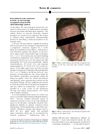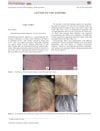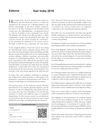 2 citations,
January 2022 in “Experimental Dermatology”
2 citations,
January 2022 in “Experimental Dermatology” GDNF signaling helps in hair growth and skin healing after a wound.
[object Object]  2 citations,
October 2021 in “Exploration of targeted anti-tumor therapy”
2 citations,
October 2021 in “Exploration of targeted anti-tumor therapy” Breast cancer hormone therapy can cause hair loss, which can be treated with daily applications of specific topical solutions like minoxidil and hydrocortisone butyrate.
2 citations,
October 2021 in “Experimental Cell Research” Injectable platelet-rich fibrin helps hair growth by boosting key cell functions.
 2 citations,
October 2020 in “Journal of Investigative Dermatology Symposium Proceedings”
2 citations,
October 2020 in “Journal of Investigative Dermatology Symposium Proceedings” The botanical treatment for hair loss shows promise, especially for children.
 2 citations,
February 2020 in “Journal of Investigative Surgery”
2 citations,
February 2020 in “Journal of Investigative Surgery” Flutamide-induced hypospadias in rats slows down early wound healing.
 2 citations,
January 2020 in “Acta dermatovenerologica Alpina, Pannonica et Adriatica (Tiskana izd.)”
2 citations,
January 2020 in “Acta dermatovenerologica Alpina, Pannonica et Adriatica (Tiskana izd.)” The drug Albendazole, used for treating parasites, can cause sudden hair loss.
2 citations,
December 2019 in “FEBS open bio” Combining specific inducers helps dermal papilla cells regain hair-forming ability.
 2 citations,
November 2019 in “Skin appendage disorders”
2 citations,
November 2019 in “Skin appendage disorders” Platelet-rich plasma doesn't prevent hair loss from chemotherapy, and mononuclear cells only help against hair loss from one specific chemotherapy drug.
 2 citations,
November 2018 in “JAAD case reports”
2 citations,
November 2018 in “JAAD case reports” Drinking kava tea can cause a skin reaction with red, swollen bumps, which may improve with steroids.
 2 citations,
May 2018 in “Australasian Journal of Dermatology”
2 citations,
May 2018 in “Australasian Journal of Dermatology” Some patients' hair grew back black and white after chemotherapy.
 2 citations,
December 2017 in “Bangladesh Journal of Pharmacology”
2 citations,
December 2017 in “Bangladesh Journal of Pharmacology” Black seed oil significantly protects against hair loss from chemotherapy.
 2 citations,
March 2017 in “Asian Journal of Beauty and Cosmetology”
2 citations,
March 2017 in “Asian Journal of Beauty and Cosmetology” Caffeic acid protects human scalp cells from UV damage.
2 citations,
June 2016 in “Düşünen Adam” Venlafaxine can cause hair loss, which stops after discontinuation.
 2 citations,
January 2014 in “Elsevier eBooks”
2 citations,
January 2014 in “Elsevier eBooks” The document concludes that reactivation of herpesviruses, especially HHV-6, is linked to severe symptoms and complications in drug-induced hypersensitivity syndrome.
 2 citations,
January 2014 in “Journal of clinical and investigative dermatology”
2 citations,
January 2014 in “Journal of clinical and investigative dermatology” Some drugs used to treat immune conditions may cause different types of hair loss.
 2 citations,
December 2013 in “Cancer Research”
2 citations,
December 2013 in “Cancer Research” Some early breast cancer patients have long-term hair loss after chemotherapy, especially older and postmenopausal women.
 2 citations,
March 2013 in “Phytotherapy Research”
2 citations,
March 2013 in “Phytotherapy Research” Ascorbigen increases hair cell growth in a lab setting but does not prevent hair loss from chemotherapy in mice.
 2 citations,
January 2012 in “InTech eBooks”
2 citations,
January 2012 in “InTech eBooks” Chemotherapy often causes hair loss, which usually grows back within 3 to 6 months, but there's no effective treatment to prevent it.
 2 citations,
January 2012 in “International Journal of Trichology”
2 citations,
January 2012 in “International Journal of Trichology” An Indian woman with Short Anagen Syndrome had very short hair and a lower quality of life.
2 citations,
November 2011 in “Current psychiatry”  2 citations,
January 2010 in “International Journal of Trichology”
2 citations,
January 2010 in “International Journal of Trichology” The Hair India 2010 conference introduced a new hair loss classification and highlighted advanced diagnostic techniques in trichology.
 2 citations,
June 2004 in “PubMed”
2 citations,
June 2004 in “PubMed” Carbamazepine caused hair loss in a man, which stopped after he stopped taking the drug.
 2 citations,
August 2002 in “BJUI”
2 citations,
August 2002 in “BJUI” Finasteride can cause low platelet count in rare cases.
 2 citations,
January 2002 in “Dermatology + psychosomatics”
2 citations,
January 2002 in “Dermatology + psychosomatics” Topiramate may cause reversible hair loss.
2 citations,
January 1986 in “PubMed” PIXE is an effective method to analyze hair's elemental composition.
 1 citations,
August 2024 in “Pharmaceuticals”
1 citations,
August 2024 in “Pharmaceuticals” Goat placenta extract in a special delivery system improved hair growth and thickness in chemotherapy patients.
[object Object]  1 citations,
April 2024 in “Journal of Pharmaceutical and Pharmacological Sciences”
1 citations,
April 2024 in “Journal of Pharmaceutical and Pharmacological Sciences” The mouse models are effective for testing new hair loss treatments.
 1 citations,
February 2024 in “Environmental health perspectives”
1 citations,
February 2024 in “Environmental health perspectives” Exposure to certain metals may worsen attention-related behaviors in adolescents, with stronger effects in females.
 1 citations,
January 2024 in “Journal of the American Academy of Dermatology”
1 citations,
January 2024 in “Journal of the American Academy of Dermatology” COVID-19 vaccines have been linked to an increase in hair loss conditions.
 1 citations,
October 2023 in “Clinical, cosmetic and investigational dermatology”
1 citations,
October 2023 in “Clinical, cosmetic and investigational dermatology” Tofacitinib improved hair loss and skin symptoms in a patient after secukinumab caused hair loss.

























